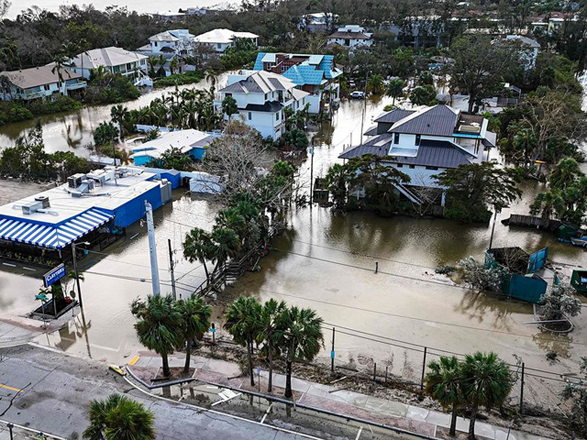ZURICH — In a year set to be declared the hottest on record, natural disasters caused $310 billion in economic losses globally in 2024, as climate change increasingly takes its toll, Swiss Re said last week.
The estimated economic losses from natural disasters were six-per cent higher than in 2023, which currently stands as the hottest year ever, the Zurich-based reinsurance giant said in a statement.
Of the total, insured losses swelled by 17 per cent year-on-year to $135 billion, with the devastating hurricanes Helene and Milton in the United States and intense flooding in Europe pushing up the costs, it said.
It marks the fifth consecutive year that insured losses have topped $100 billion, the Swiss company said.
"Much of this increasing loss burden results from value concentration in urban areas, economic growth, and increasing rebuilding costs," Balz Grollimund, Swiss Re's head of catastrophe and perils, said in the statement.
Swiss Re, which serves as an insurer of insurance companies, stressed the impact of climate change, with this year on course to be declared the hottest since records began.
Just this week, China, the world's leading emitter of the greenhouse gases scientists say are driving climate change, reported its warmest autumn ever recorded.
Intense flooding
Global warming can make extreme weather more frequent and intense, not only through high temperatures but also the knock-on effect of extra heat in the atmosphere and the seas.
"By favouring the conditions leading to many of this year's catastrophes, climate change is also playing an increasing role," Grollimund said.
The European Union's climate monitor Copernicus said last month that 2024 would likely be more than 1.55 degrees Celsius (2.8 degrees Fahrenheit) above the 1850-1900 average — the period before the industrial-scale burning of fossil fuels.
This does not amount to a breach of the Paris climate accords, which strive to limit global warming to below 2C and preferably 1.5C, because that is measured over decades and not individual years.
But scientists say the safer 1.5C limit is rapidly slipping out of reach, while stressing that every tenth of a degree in temperature rises heralds progressively more damaging impacts.
Swiss Re highlighted in particular the swelling insurance cost of floods in 2024, which was the third-costliest year for that peril worldwide and the second-costliest year for floods in Europe.
Intense flooding in Europe alone caused around $10 billion in insured losses this year, it said, pointing to the major floods in the wake of Storm Boris in Central Europe in September and the devastating floods in Spain in October that killed at least 230 people.
It also highlighted the massive flooding in the Gulf region in April, which disrupted operations at Dubai airport, the world's busiest international hub.
Hurricane havoc
The United States saw the highest insured losses this year.
Hurricanes Helene and Milton struck the southeastern United States in quick succession in late September and early October.
They alone resulted in estimated insured losses approaching $50 billion, Swiss Re said.
Coupled with a high frequency of severe thunderstorms, it meant the United States accounted for at least two-thirds of 2024's total global insured losses, its estimates showed.
Swiss Re warned global insured losses were sure to keep climbing.
"Losses are likely to increase as climate change intensifies extreme weather events while asset values increase in high-risk areas due to urban sprawl," it said.
"Adaptation is therefore key, and protective measures, such as dykes, dams and flood gates, are up to 10 times more cost-effective than rebuilding."
